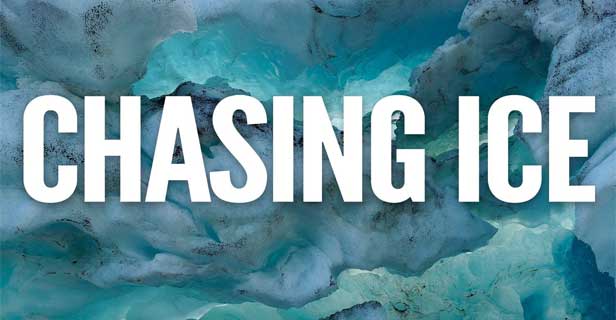
In his documentary "Chasing Ice" the passionate environmental photographer James Balog faces life-threatening situations and extreme conditions to capture stunning and powerful images of glaciers melting under the effect of Climate Change.
Balog's quest to visualize the "biggest story facing humanity" began in 2005, when an assignment for National Geographic led him to the Arctic of Iceland. Struck by the shocking changes in the ice, he started the Extreme Ice Survey (EIS) in 2007 as a photography project using time-lapse cameras over a period of several years to document the rapid glacier changes in the Arctic.
Together with his fellow adventurers he goes on a dangerous mission defying most extreme weather conditions, experiencing major technological set-backs and facing their own mortality. His willpower becomes most obvious when he is climbing on the icy glaciers with a severe knee injury holding onto his crutches to be able to take the most impressive picture. For James Balog this mission has become a "never-ending quest" in the desperate effort to raise awareness of the world's most urgent threat.
The film touches the audience to the very core, its pictures being both breathtakingly beautiful and terrifying at the same time, leaving you scared and thoughtful. But that is exactly the purpose of this film - people need visual evidence to understand how serious the situation is. "The time is clicking", James Balog warns us, "We are at the moment of a global apocalyptic change and humans are causing it."
"Chasing Ice" was screened on 2 June 2014 as part of the monthly Ciné-ONU Vienna film screenings, organised by the United Nations Information Service (UNIS) Vienna in cooperation with This Human World (THW) Film Festival and Topkino. The screening marked World Environmental Day, observed annually on 5 June.
The panel discussion featured the Head of the Austrian Department for Air Quality and Climate Change, Helmut Hojesky, Head of the Centre for Global Change and Sustainability of the University of Natural Resources and Life Sciences (BOKU) Vienna, Helga Kromp-Kolb, the Head of the UNEP Liaison Office in Vienna, Harald Egerer and the Acting Director of UNIS Vienna, Martin Nesirky, as the moderator.
The panellists unanimously agreed that there is no scientific doubt that Climate Change is happening. In regard to combating Climate Change and its impact on our world, too little is happening and we are far away from solving the problem, said Helmut Hojesky. Harald Egerer stressed the importance of an international agreement, though the search for a global consensus resulting in real action is a difficult road to follow.
Helga Kromp-Kolb thought that the root of our problem is the economy and emphasized the need for a discussion on values and a review of priorities. She made an important point of saying that "everybody can do something as an individual to make change happen, by leading a more conscious life". The change does not solely lie in the hands of the politicians but starts with the action of every single person. This can be the heroic work of a photographer risking his life trying to raise awareness or the action of a person who decides to leave the car and take the bike. As James Balog says: "When my children ask me, what did you do when you knew that climate change was happening, and that we could stop it… I want to be able to say I did everything I could."